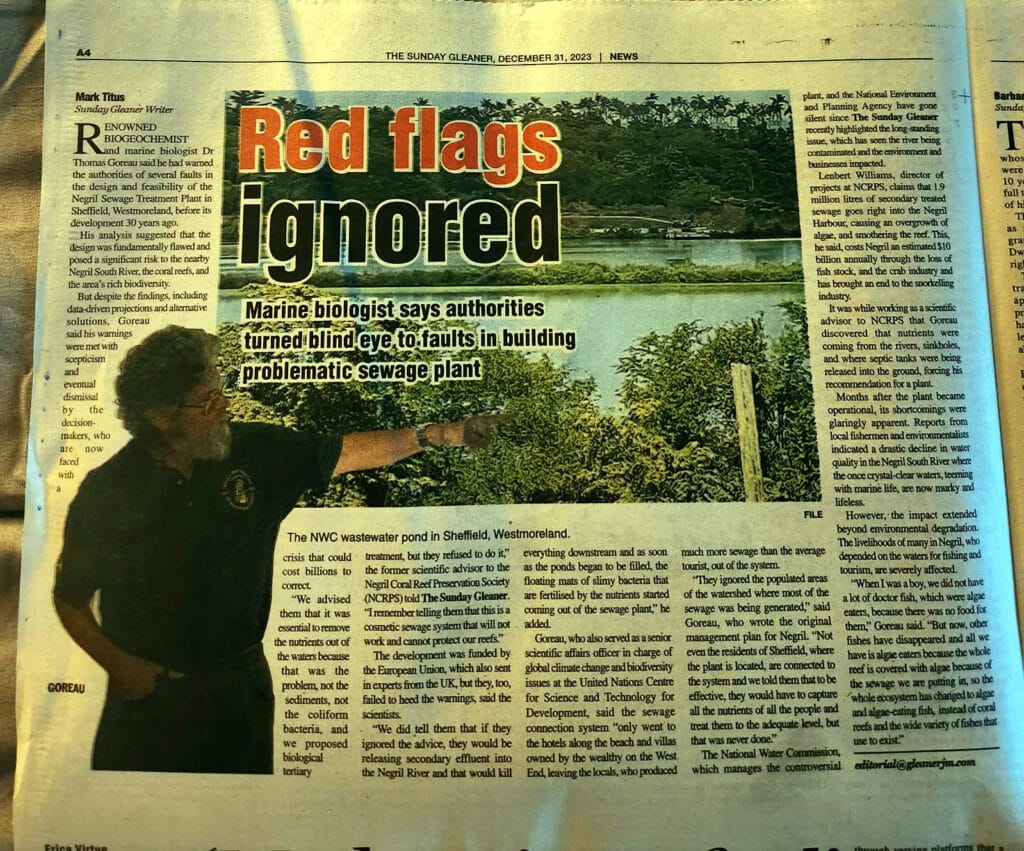Red flags ignored: Marine biologist says authorities turned blind eye to faults in building problematic sewage plant
by Tom Goreau | Dec 31, 2023 |
January 1 2024
Global Coral Reef Alliance 2024
New Years Resolution:
Save coral reefs: stop polluting the ocean and atmosphere
Published:
Sunday | December 31, 2023 | 12:08 AM Kingston, Jamaica
Mark Titus – Sunday Gleaner Writer
Renowned biogeochemist and marine biologist Dr Thomas Goreau said he had warned the authorities of several faults in the design and feasibility of the Negril Sewage Treatment Plant in Sheffield, Westmoreland, before its development 30 years ago.
His analysis suggested that the design was fundamentally flawed and posed a significant risk to the nearby Negril South River, the coral reefs, and the area’s rich biodiversity.
But despite the findings, including data-driven projections and alternative solutions, Goreau said his warnings were met with scepticism and eventual dismissal by the decision-makers, who are now faced with a crisis that could cost billions to correct.
“We advised them that it was essential to remove the nutrients out of the waters because that was the problem, not the sediments, not the coliform bacteria, and we proposed biological tertiary treatment, but they refused to do it,” the former scientific advisor to the Negril Coral Reef Preservation Society (NCRPS) told The Sunday Gleaner. “I remember telling them that this is a cosmetic sewage system that will not work and cannot protect our reefs.”
The development was funded by the European Union, which also sent in experts from the UK, but they, too, failed to heed the warnings, said the scientists.
“We did tell them that if they ignored the advice, they would be releasing secondary effluent into the Negril River and that would kill everything downstream and as soon as the ponds began to be filled, the floating mats of slimy bacteria that are fertilised by the nutrients started coming out of the sewage plant,” he added.
Goreau, who also served as a senior scientific affairs officer in charge of global climate change and biodiversity issues at the United Nations Centre for Science and Technology for Development, said the sewage connection system “only went to the hotels along the beach and villas owned by the wealthy on the West End, leaving the locals, who produced much more sewage than the average tourist, out of the system.
“They ignored the populated areas of the watershed where most of the sewage was being generated,” said Goreau, who wrote the original management plan for Negril. “Not even the residents of Sheffield, where the plant is located, are connected to the system and we told them that to be effective, they would have to capture all the nutrients of all the people and treat them to the adequate level, but that was never done.”
The National Water Commission, which manages the controversial plant, and the National Environment and Planning Agency have gone silent since The Sunday Gleaner recently highlighted the long-standing issue, which has seen the river being contaminated and the environment and businesses impacted.
Lenbert Williams, director of projects at NCRPS, claims that 1.9 million litres of secondary treated sewage goes right into the Negril Harbour, causing an overgrowth of algae, and smothering the reef. This, he said, costs Negril an estimated $10 billion annually through the loss of fish stock, and the crab industry and has brought an end to the snorkelling industry.
It was while working as a scientific advisor to NCRPS that Goreau discovered that nutrients were coming from the rivers, sinkholes, and where septic tanks were being released into the ground, forcing his recommendation for a plant.
Months after the plant became operational, its shortcomings were glaringly apparent. Reports from local fishermen and environmentalists indicated a drastic decline in water quality in the Negril South River where the once crystal-clear waters, teeming with marine life, are now murky and lifeless.
However, the impact extended beyond environmental degradation. The livelihoods of many in Negril, who depended on the waters for fishing and tourism, are severely affected.
“When I was a boy, we did not have a lot of doctor fish, which were algae eaters, because there was no food for them,” Goreau said. “But now, other fishes have disappeared and all we have is algae eaters because the whole reef is covered with algae because of the sewage we are putting in, so the whole ecosystem has changed to algae and algae-eating fish, instead of coral reefs and the wide variety of fishes that use to exist.”

Save Coral Reefs: Stop polluting the ocean and atmosphere

